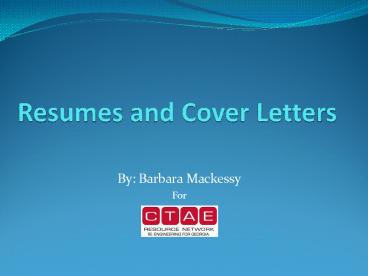Resumes and Cover Letters - PowerPoint PPT Presentation
1 / 13
Title:
Resumes and Cover Letters
Description:
By: Barbara Mackessy For Business letters & Resume Both are required when making a first impression to potential employers before they ever meet you. – PowerPoint PPT presentation
Number of Views:339
Avg rating:3.0/5.0
Title: Resumes and Cover Letters
1
Resumes and Cover Letters
- By Barbara Mackessy
- For
2
Business letters Resume
- Both are required when making a first impression
to potential employers before they ever meet you. - Both are to be professional in quality
3
Letter of Introduction
- A business letter
- Introduce yourself
- Why you are writing this letter?
- Interest areas
- Career expectations
- Explain how you could be of a benefit
4
Cover Letter
- Use business letter format
- A cover letter is a short one page letter that
goes on top of your Resume. - To Introduce yourself
- Prospective position you are applying for
Highlight a couple of items from your resume to
give the employer a positive impression about
what you can do. Research the open position, and
highlight some points from your resume that would
make you a good match for that position. - Address the cover letter directly to a person,
not to whom it may concernIn the cover letter
state that you are interested in the ____
position and that you will contact them in the
near future. - Proof read and correct your cover letter and then
have someone else double check your cover letter
before sending it with your resume. - The purpose of the cover letter is to introduce
yourself and your skills to entice a prospective
employer to read your resume.
5
Resume
- A Resume is a summary of your life that is sent
to a prospective employer prior to you getting an
interview. - A well formatted Resume will make the difference
in a prospective employer desiring to interview
you or not.
6
Your Resume Start by making a rough draft of
your life, education, work experiences, extra
curricular activities, skills and abilities.
Now cross off all of the times that were not
really important or that you dont think a
prospective employers would need to know about
you. Revise your list by putting the remaining
items in chronological order.This is the basis
for your Resume.
7
Resume
- Compact summary of your life
- Your information (address, email etc.)
- Your education
- Your experiences
- Your skills
- Your extra curricular activities
- Your references
8
Your resumeYour resume could determine --if
the company wants to meet you at all--if you
will be contacted --if you will be
interviewed--if you will be hired In today's
competitive market, a well-designed resume will
give you an advantage.
9
Remember that your resume is the first impression
of yourself to a prospective employer.
10
Chronological order is used more often Create
an easy to followed format List most recent
educational and work experience first Put
starting/ending dates/years, place of employment,
title, and duties with your work experiences
11
Use Resume words such as accomplished,
achieved, acted, analyzed, assembled, assisted,
built, calculated, classified, compiled,
conducted, contributed, constructed,
coordinated, created, designed, developed,
diagnosed, delivered, directed, displayed,
distributed, evaluated, examined, expanded,
expedited, founded, guided, identified,
increased, improved, initiated, issued,
installed, instructed, invented, investigated,
maintained, managed, mediated, monitored,
operated, organized, originated, oversaw,
performed, planned, prepared, presented,
processed, produced, prompted, proposed.
provided, recorded, recruited, represented,
restored, researched, scheduled, served,
strengthened, solved, supervised, tested
trained, updated(Give students the Words to Use
on a Resume Handout)
12
List names, addresses, phone numbers and e-mail
addresses of references (on the same quality
paper and font as the resume). You should
use "references available upon request" only when
you need to protect the list of references from
falling into the wrong hands.
13
Be honest on your resume! Be confident!Now
develop and construct your own cover letter and
Resume.































